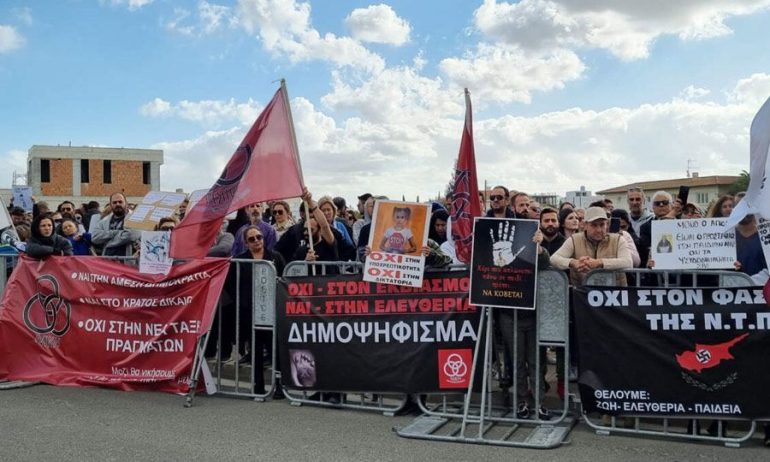The turn his pandemic is taking Covid-19 in Cyprus, with outbreaks, vaccination stagnation and sometimes ineffective government measures are accelerating the reaction of those social groups that oppose –With non-rational / cognitive criteria- in the existence of the virus.
This time, The reason was the mandatory use of a mask by elementary school students with the reactions coming from a portion of parents who oppose such a possibility. Lately we have seen not only the well-known protests with road closures but also a series of threats of violence against teachers (primary school teachers) as well, in the case of Limassol, and almost an attack using an improvised explosive device.
As "K" has analyzed in the past, mapping the social origins and ideology of these groups, what appears - and is an extremely disturbing development for the Cypriot society - is that these protesting people escape from the purely ideological dimension (at the core of which the "average" is the refusal to comply with the measures) and resort to violent activism. A classic, in short, pattern from radicalization to violent radicalization.
Despite the unprecedented pandemic but also the wider dimension - at European level - of the phenomenon of "negatives" (let us characterize them as such for reasons of brevity) society and institutions have so far failed to convince some self-evident things regardless of conspiracy theories or the very qualitative characteristics of the negatives (low educational or living standard, lupine masses, etc.).
Experience so far shows how failure is based on three points:
1. Proportionality of measures. Even if you convince someone who denies the existence of the virus, the whole debate over the implementation of measures, protocols and campaigns (eg vaccination) takes on a legal, legitimate public debate, which is reproduced in endless cycles of obligation rather than segregation. of the people. Historical experience has shown that even if e.g. abolished seats on public buses in the US (the beginning of the social rights movement and racial discrimination), there are still racists against blacks. The golden section must be sought in how to persuade the unvaccinated, to be vaccinated by building a culture of social responsibility based on rational criteria.
2. In the implementation / observance of the measures. Indeed, almost two years after the outbreak of the pandemic in Cyprus, the way in which checks were carried out became problematic and, at times, ineffective, failing to find a way that would make citizens more willing to move from a state of doubt to a state of knowledge. consent.
3. Inconsistency in enforcement policies. The irrational weighting of the various developments in relation to the pandemic (eg variants of the virus) or the periodicity of the increase of the cases (eg winter period) created more conditions of confusion among the citizens compared to the adoption of a model strictly adapted to the Cypriot , so far, experience from interacting with the virus.
Of course, informing the public, convincingly and effectively, remains the goal in order, in particular, for hardline ideologues to be convinced of the irrationality and irrationality of their crises in relation to the pandemic and the whole of the population - tired of the ongoing rotation of measures and policies - to feel more relieved. The information campaign in the first case must look for methods based on common sense. As for the second issue, teleworking is a prime example of how a young couple vaccinated with a newborn baby could stop worrying about transmitting the disease to their baby.
The provocation of violence
Both in the case of the events in the "DIAS" complex and in the case of threats of use of force against teachers in primary education, it became clear that as the pandemic progresses its cycle, the various groups strengthen or redefine their ideological irrationality or differentiate it. their operandi. The inclination towards violence should concern both the State and society in terms of the issue of violent radicalization and in relation to the organizational part of the protests. The latter remains an extremely critical field precisely because these groups are usually run by individuals (individuals) or associations of people who have interests with a specific footprint - e.g. the economic or political exploitation of human fear, the manipulative exploitation in various aspects of everyday life and the ideologicalization of basic human reactions (eg reasonable questions in relation to vaccination). The more the pandemic insists on redefining itself, the more the reaction will grow and acquire more "militaristic" aspects. The example of the students and the mask also showed that parental control in Cyprus must be redefined in the context of a new social contract, reminding that the more you invest and the better "bottom up" the more problems you solve along the way.
What is required, however, remains the path from ideological radicalization to violent radicalization, namely that thin line whose passage will transform an e.g. conspiracy theorist in relation to the coronavirus guardian of a minor child, who disagrees with the use of a mask to become - potentially - a threat to other children, their parents and their teachers in the school of his local community. To follow this path and to build those policies that will predetermine its completion requires not only political will: But also an interdisciplinary approach, simplicity and experience that includes other factors (eg development). And, most importantly, something that became apparent just as long as the pandemic in Cyprus lasts, substance versus communication. And to learn from all the mistakes that have been made - so far.
kathimerini.com.cy
